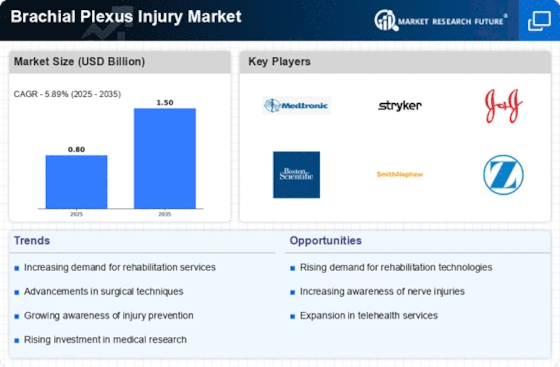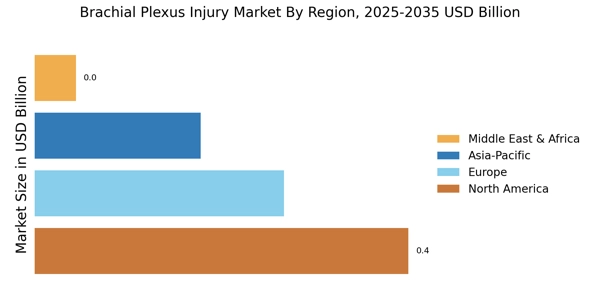Advancements in Surgical Techniques
Innovations in surgical techniques are transforming the landscape of the Brachial Plexus Injury Market. The development of nerve grafting and nerve transfer procedures has shown promising results in restoring function to affected limbs. Recent studies indicate that these advanced surgical interventions can lead to improved recovery outcomes, with success rates reaching up to 80% in certain cases. As surgeons become more adept at these techniques, the overall efficacy of treatments for brachial plexus injuries is expected to improve. This evolution in surgical practice not only enhances patient outcomes but also stimulates market growth as healthcare facilities invest in training and technology to support these advancements.
Growing Demand for Rehabilitation Services
The increasing recognition of the importance of rehabilitation services for individuals with brachial plexus injuries is a significant driver in the Brachial Plexus Injury Market. Rehabilitation plays a crucial role in restoring function and improving quality of life for patients. Data suggests that approximately 60% of individuals with these injuries require ongoing therapy to regain mobility and strength. As healthcare systems emphasize holistic approaches to treatment, the demand for specialized rehabilitation services is likely to rise. This trend may lead to the establishment of more rehabilitation centers and the development of tailored programs, thereby expanding the market and enhancing patient care.
Rising Awareness and Education Initiatives
Increased awareness and education regarding brachial plexus injuries are pivotal in shaping the Brachial Plexus Injury Market. Campaigns aimed at educating both healthcare professionals and the public about the causes, symptoms, and treatment options are gaining traction. This heightened awareness is likely to lead to earlier diagnosis and intervention, which can significantly improve patient outcomes. Furthermore, as more individuals become informed about the potential for recovery, the demand for specialized care and innovative treatment options may increase. This trend suggests a positive outlook for the market as stakeholders recognize the importance of proactive management of these injuries.
Increasing Incidence of Brachial Plexus Injuries
The rising incidence of brachial plexus injuries is a notable driver for the Brachial Plexus Injury Market. Factors contributing to this increase include road traffic accidents, sports injuries, and birth-related trauma. According to recent data, the prevalence of these injuries is estimated to affect approximately 1.5 to 3 per 1,000 live births, indicating a significant concern for healthcare systems. As awareness grows regarding the long-term implications of these injuries, the demand for effective treatment options is likely to escalate. This trend suggests that healthcare providers may need to allocate more resources towards the management and rehabilitation of affected individuals, thereby propelling the market forward.
Technological Integration in Treatment Modalities
The integration of technology into treatment modalities is emerging as a key driver in the Brachial Plexus Injury Market. Innovations such as telemedicine, robotic-assisted surgery, and advanced imaging techniques are enhancing the diagnosis and treatment of brachial plexus injuries. For instance, telemedicine allows for remote consultations, making specialized care more accessible to patients in underserved areas. Additionally, robotic-assisted surgeries are improving precision and outcomes in surgical interventions. As these technologies continue to evolve, they are likely to attract investment and interest from healthcare providers, thereby fostering growth in the market and improving patient care.

















